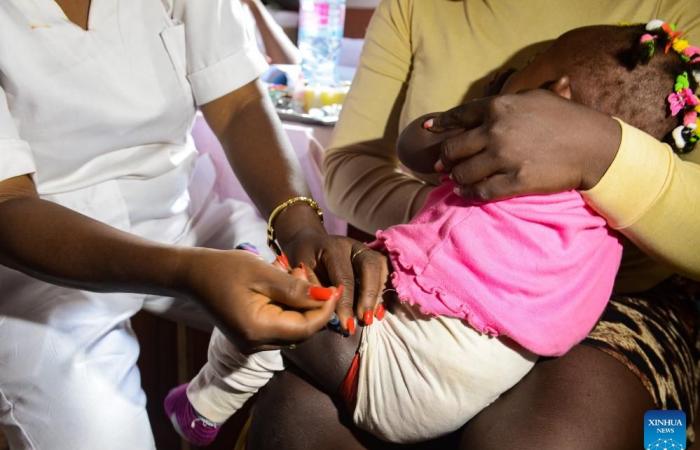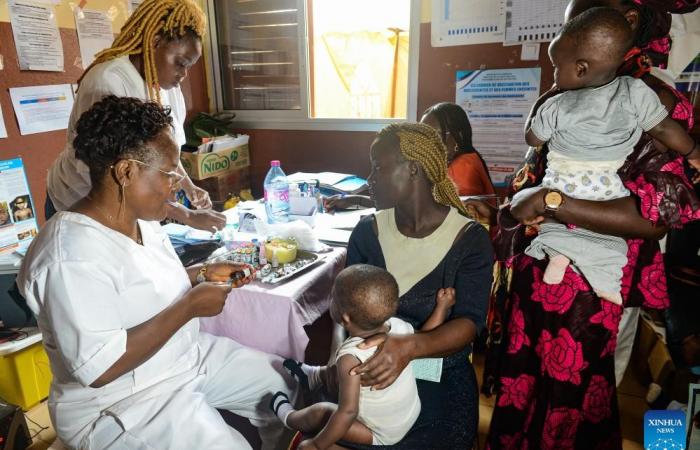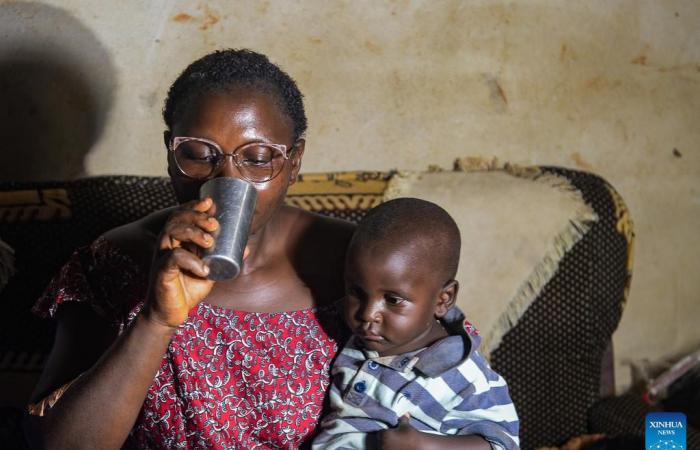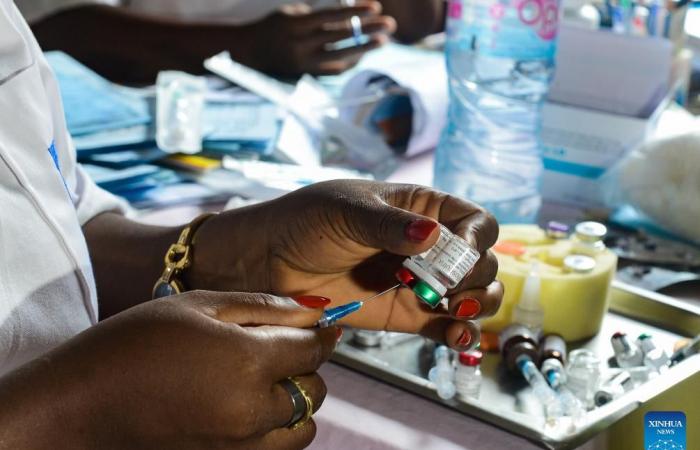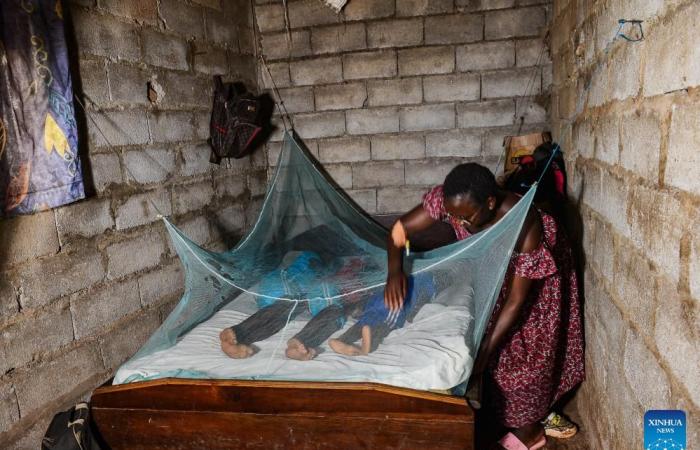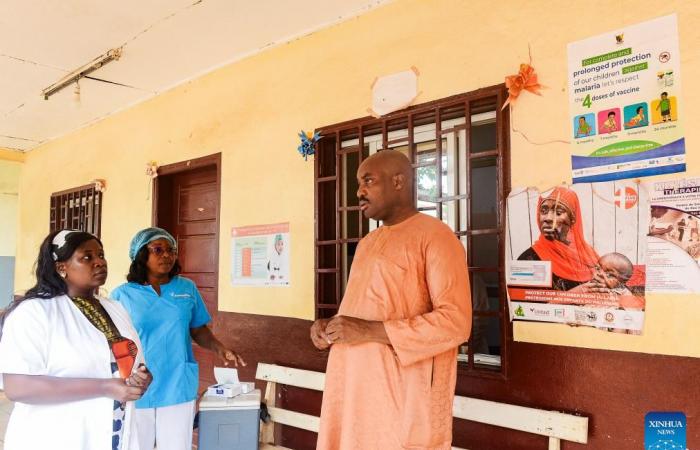A nurse vaccinates a child against malaria at a district hospital in Soa, Cameroon, on April 17, 2024. Almost the entire population of Cameroon, more than 27 million people, is at risk of contracting malaria, a daunting health challenge especially for pregnant women and children in the Central African country. In 2022 alone, according to the World Health Organization, Cameroon recorded more than 6.4 million cases of the disease and more than 12,500 deaths related to malaria. China is sharing its experience in malaria prevention and control with Cameroon and contributing to the fight against the disease. China has been sending medical teams and professionals to Cameroon since 1975, serving the local population and improving local health services. (Xinhua/Kepseu)
YAOUNDE, April 25 (Xinhua) — In Soa, a city about 20 kilometers north of Cameroon’s capital Yaoundé, malaria is endemic.
“We are constantly sick, me, the children and the father. We live with malaria,” said Arlette Diane Miafo Zeuna, a native of Soa.
Like Zeuna, almost the entire population of Cameroon, more than 27 million people, is at risk of contracting malaria, a daunting health challenge particularly for pregnant women and children in the Central African country.
In 2022 alone, according to the World Health Organization, Cameroon recorded more than 6.4 million cases of the disease and more than 12,500 deaths related to malaria.
Cameroon aims to create multiple levels of protection against malaria and work closely with partners to develop, invest and implement new tools and innovations, said Paul Onambele, a public health expert who heads the Soa Health District.
“We have other partners in the fight against malaria, but China is very welcome,” he said. “We have great cooperation with her.”
Thanks to a scholarship, he received training in public health at Beijing University in China, which eliminated malaria after decades of efforts, and the valuable experience could provide innovative paths for Cameroon, said Onambele.
“What happened in China was a miracle. Malaria was once acute there, but China has reduced the annual number of malaria infections from about 30 million in the 1940s to zero in 2017,” he said. “The Chinese healthcare system is inspiring. It puts the community and its involvement at the center of its operations.”
China is sharing its experience in preventing and controlling malaria with Cameroon and contributing to the fight against the disease, said Jerry Afanda, an epidemiologist at Cameroon’s St. Louis Institute of Health.
China has been sending medical teams and professionals to Cameroon since 1975, serving the local population and improving local health services. “These efforts have led to a significant reduction in malaria prevalence rates,” said Afanda.
He called for more cooperation, especially in the fight against malaria. “Cameroonian experts can travel to China to learn from the successes in the fight against the disease.”
Ita Ebot, another public health expert, highlighted China’s approach to malaria prevention and control, which emphasizes the importance of eliminating the source of infection and controlling the spread of the disease, with the help of traditional Chinese medicine.
“This approach is based on the principles of traditional Chinese medicine, which prioritizes addressing the root cause of an illness rather than just treating the symptoms,” Ebot said. “This is something we urgently need in treating malaria in Cameroon, and China can help with this.”
The government of Cameroon, with the support of partners and friendly countries, is implementing malaria vaccination, mosquito nets, preventive treatment for children and pregnant women, and community-based testing and treatment services to control the disease.
“These methods have helped reduce mortality rates,” said Jean Fosso, deputy permanent secretary of the National Malaria Control Program at the Ministry of Public Health.
Cameroon aims to be at the forefront of using the latest life-saving tools to respond and build on the progress made over the past decade in malaria prevention and control, but it needs “much-needed” resources, Fosso said.
“With more investment, Cameroon will be on the right track to control and eventually eliminate malaria. Our main difficulty now is mobilizing financial resources,” said Fosso.
A nurse prepares a dose of malaria vaccine at a district hospital in Soa, Cameroon, on April 17, 2024. Almost the entire population of Cameroon, more than 27 million people, is at risk of contracting malaria, a daunting health challenge mainly for pregnant women and children in the Central African country. In 2022 alone, according to the World Health Organization, Cameroon recorded more than 6.4 million cases of the disease and more than 12,500 deaths related to malaria. China is sharing its experience in malaria prevention and control with Cameroon and contributing to the fight against the disease. China has been sending medical teams and professionals to Cameroon since 1975, serving the local population and improving local health services. (Xinhua/Kepseu)

Arlette Diane Miafo Zeuna (left), a native of Soa, drinks a traditional anti-malaria drink in Ebang, a neighborhood in the commune of Soa, Cameroon, on April 17, 2024. Almost the entire population of Cameroon, more than 27 million people, is at risk of contracting malaria, a daunting health challenge particularly for pregnant women and children in the Central African country. In 2022 alone, according to the World Health Organization, Cameroon recorded more than 6.4 million cases of the disease and more than 12,500 deaths related to malaria. China is sharing its experience in malaria prevention and control with Cameroon and contributing to the fight against the disease. China has been sending medical teams and professionals to Cameroon since 1975, serving the local population and improving local health services. (Xinhua/Kepseu)
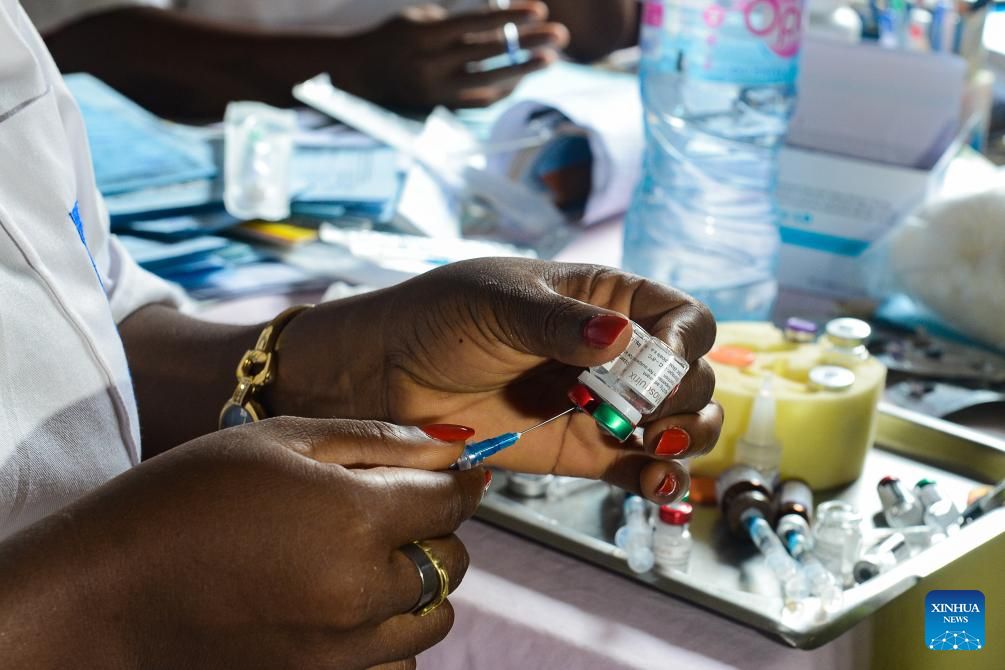
A nurse prepares a dose of malaria vaccine at a district hospital in Soa, Cameroon, on April 17, 2024. Almost the entire population of Cameroon, more than 27 million people, is at risk of contracting malaria, a daunting health challenge mainly for pregnant women and children in the Central African country. In 2022 alone, according to the World Health Organization, Cameroon recorded more than 6.4 million cases of the disease and more than 12,500 deaths related to malaria. China is sharing its experience in malaria prevention and control with Cameroon and contributing to the fight against the disease. China has been sending medical teams and professionals to Cameroon since 1975, serving the local population and improving local health services. (Xinhua/Kepseu)

People queue to vaccinate children against malaria at a district hospital in Soa, Cameroon, on April 17, 2024. Almost all of Cameroon’s population, more than 27 million people, are at risk of contracting malaria, a health challenge scary especially for pregnant women and children in the Central African country. In 2022 alone, according to the World Health Organization, Cameroon recorded more than 6.4 million cases of the disease and more than 12,500 deaths related to malaria. China is sharing its experience in malaria prevention and control with Cameroon and contributing to the fight against the disease. China has been sending medical teams and professionals to Cameroon since 1975, serving the local population and improving local health services. (Xinhua/Kepseu)

Arlette Diane Miafo Zeuna (right), from Soa, places a mosquito net with insecticide to protect her children against malaria in Ebang, a neighborhood in the commune of Soa, Cameroon, on April 17, 2024. Almost the entire population of Cameroon, over 27 million people, are at risk of contracting malaria, a daunting health challenge particularly for pregnant women and children in the Central African country. In 2022 alone, according to the World Health Organization, Cameroon recorded more than 6.4 million cases of the disease and more than 12,500 deaths related to malaria. China is sharing its experience in malaria prevention and control with Cameroon and contributing to the fight against the disease. China has been sending medical teams and professionals to Cameroon since 1975, serving the local population and improving local health services. (Xinhua/Kepseu)
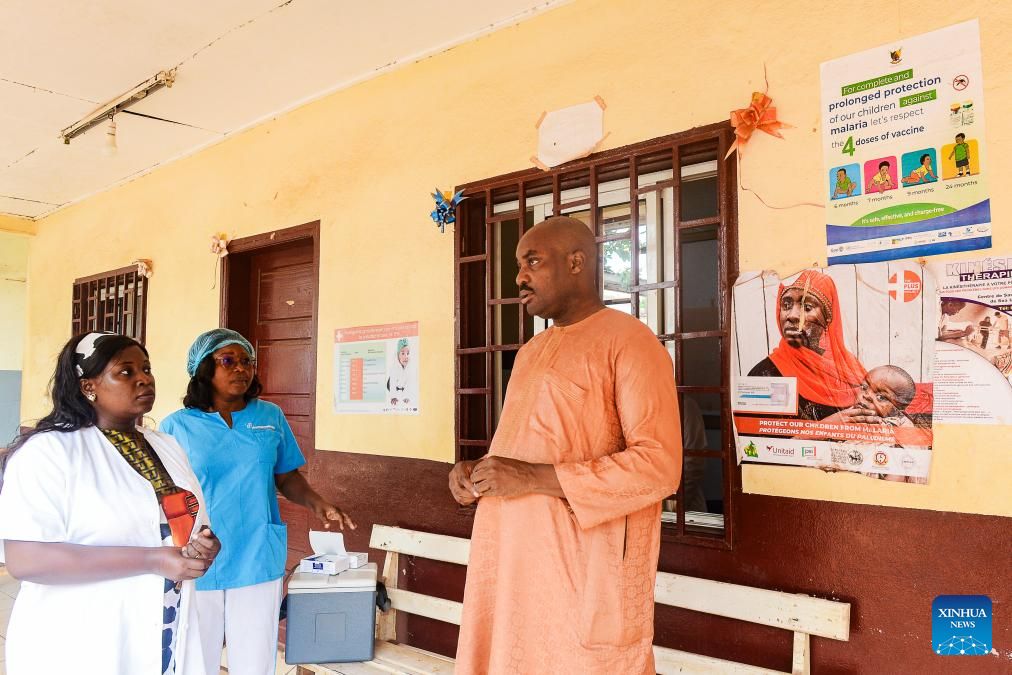
Paul Onambele (right), a public health specialist who heads the Soa Health District, talks to nurses at a hospital in Soa, Cameroon, on April 17, 2024. Almost the entire population of Cameroon, more than 27 million people, is at risk of contracting malaria, a daunting health challenge particularly for pregnant women and children in the Central African country. In 2022 alone, according to the World Health Organization, Cameroon recorded more than 6.4 million cases of the disease and more than 12,500 deaths related to malaria. China is sharing its experience in malaria prevention and control with Cameroon and contributing to the fight against the disease. China has been sending medical teams and professionals to Cameroon since 1975, serving the local population and improving local health services. (Xinhua/Kepseu)
Tags: Cameroonian doctors seek strengthen cooperation China combat malariaXinhua
--
